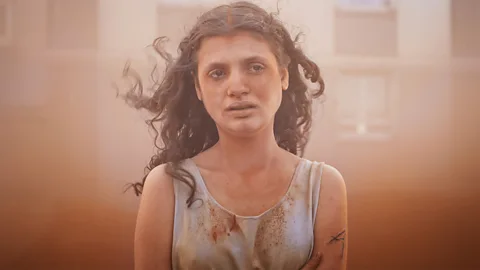 Courtesy of Cannes Movie Pageant
Courtesy of Cannes Movie PageantAfter profitable the Palme d’Or for the surprising Titane, out-there French director Julia Ducournau is again at Cannes with one other nightmarishly bizarre movie – nevertheless it’s an unsatisfying watch.
One of the vital anticipated titles at this yr’s Cannes Movie Pageant was Alpha, written and directed by Julia Ducournau. Her final movie, the magnificently bonkers Titane, gained the Palme d’Or in 2021, so the information that she was returning to Cannes with one other fizzing cocktail of icky physique horror and traumatic household relationships had festival-goers excited – if nervous – to see what nightmarish weirdness Ducournau had in retailer.
It seems that there’s nightmarish weirdness aplenty. A disorientating, maddening whirlwind of haunting sights, thunderous music and fiercely intense performances, Alpha confirms that Ducournau is a visionary artist. However as soon as you’ve got recovered from the brain-bashing expertise of watching her newest movie, it comes to appear rather a lot much less satisfying and stimulating than Titane was.
Alpha will get its title from its heroine (Mélissa Boros), a 13-year-old lady who lives in an unnamed French city together with her single mom (Golshifteh Farahani). She is not particularly rebellious, however one evening she comes house from a celebration with a big capital letter A carved into her arm by a needle the scale of a chopstick. Her mom, a health care provider, is understandably upset, particularly because the amateurish tattoo may need given Alpha a mysterious virus that turns folks to stone. Because the months cross, patches of their pores and skin harden, they cough clouds of mud, and ultimately they atrophy into cadavers manufactured from polished, cracked, creamy white marble. It is a creepy demise, but in addition a unusually stunning one: in impact, the deceased are remodeled into their very own gleaming, cathedral-worthy memorial statues.
Whereas the physician diligently takes care of sufferers with this virus in her spookily understaffed hospital, Alpha’s tattoo will not cease gushing blood, an embarrassing affliction that prompts her classmates to shun her. (That is offered as a despicable instance of prejudice, however, actually, do not the kids have some extent?) However the physician would not simply have her daughter and her sufferers to fret about. One one that positively has the virus is her estranged brother Amin (Tahar Rahim), a mischievous and charismatic drug addict.
Some scenes close to the start of Alpha promise that it will likely be Ducournau’s model of a zombie apocalypse thriller. Paranoia rises to hysteria on the hospital, the place a safety guard struggles to maintain the contaminated exterior, and on the faculty, the place college students flee as a swimming pool is dyed pink with Alpha’s blood. Set in a rundown alternate actuality, by which the tough gentle and muted colors counsel that the top is nigh, the movie has sequences paying homage to every little thing from 28 Days Later to World Warfare Z, however Ducournau offers them their very own uniquely unsettling, poetic ambiance.
The disappointing half is that, finally, she does so little with the turning-to-stone illness. Flitting between two time intervals (it’s a must to preserve a detailed eye on Farahani’s haircut to inform which is which), the movie unfolds within the Eighties and the 90s. The virus is related to homosexual folks and shared needles. And the individuals who have the virus, or who’re suspected of getting it, are handled with homophobia and ignorance. Briefly, the state of affairs is an analogy for the Aids epidemic, as Ducournau has acknowledged.
Alpha
Director: Julia Ducournau
Forged: Mélissa Boros, Golshifteh Farahani, Tahar Rahim, Emma Mackey
There may be nothing improper with that, per se. Movies usually use fictional diseases to touch upon actual ones. The difficulty with Alpha is that the fictional sickness would not shed any new gentle on its non-fictional counterpart, nor does it broaden upon it to construct a extra resonant and common fable. The metaphor is not a wealthy one. The virus is Aids by one other title, and that is about it. Certainly, for a lot of the operating time, the movie drifts away from the magic-realist features of the situation altogether, which is a waste of such a fabulously conceived and executed visible impact. The characters appear to neglect that they are turning to stone, nobody ever discusses the virus’s origins or potential treatment, and the overcrowding and panic it triggered on the hospital simply evaporate. What we’re left with is an intimate drama about three relations who’re rocked by habit and sickness.
This raises the niggling query of why Ducournau bothered with the movie’s science-fiction parts in any respect. If Alpha is actually a movie about a health care provider tending to her addict brother, and the teenage lady caught between them, why disguise it with magic realism? In an early scene, Alpha’s trainer reads out Edgar Allen Poe’s poem, A Dream Inside a Dream, and shortly afterwards, Terry Gilliam’s fantastical The Adventures of Baron Munchausen is proven on tv, so Ducournau offers us honest warning that her personal narrative should not be taken actually. However she appears oddly unwilling to commit both to the fantasy or the truth, which is why, for all the sound and fury of its hallucinatory imagery, it would not signify all that a lot. The muddled story of Amin’s habit is wanting perception and believable element, and but the spine-tingling story of the supernatural epidemic is skated over, too.
Ducournau has jumped between totally different genres inside her work earlier than, however Alpha may need been extra highly effective if she had caught to 1. Contemplating that she has been rightly celebrated for her fearless decisions, it feels barely cowardly that she did not try a movie about Aids with none outlandish horror trappings wrapped round it.





